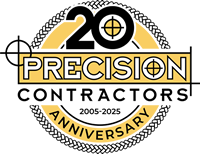
07 Dec How to Choose a Commercial General Contractor
Finding the right general contractor (GC) for your commercial construction project can be the difference between success and costly failure.
Yes, you need a general contractor
One of the first questions you may have is “do I even need a general contractor?” You do. Beyond the experience and expertise a qualified contractor can add to your efforts, it’s often not possible to get the proper construction permits or secure financing for your project without a licensed general contractor.
There are many risks that come with a commercial building project and having a strong general contractor on your team can proactively mitigate potential risk and protect your investment.
Don’t assume all GCs are equally qualified or best suited for your project. Consider your industry, the type, and size of your project because these will influence your selection process. Some GCs are too large, with very high labor and overhead cost, and can be overwhelming for certain clients.
How to pick the right General Contractor
Ask for referrals. A referral from a friend or colleague is an excellent indicator of a contractor worth adding to your initial list of potential options. Someone isn’t going to share a company name with you unless they have confidence in that business.
Lenders and architects are good sources of information on GCs.
Create a selection criterion with priorities and a checklist so you can ensure you are able to complete your evaluation consistently and facilitate an apples-to-apples comparison throughout the process.
Once you get a few leads, review their websites and look for contractors that demonstrate experience in the market you’re in. Make sure they are licensed and insured. You may also need a general contractor that is bondable. Pay attention to their website as a quality website is an indicator of a serious business.
Set up the first meeting. You should try and answer four main questions in this meeting:
- Is this GC the right size for the project?
- Are they aligned with my industry?
- Will they be a good partner?
- Will they fit within your larger team (architects, engineers, etc.)?
To avoid surprises, your GC must demonstrate active listening and communication skills, and proactively share information within the team.
Can the GC add value to your team? Will they strive to understand your business and help you achieve your objectives and priorities? Will they consistently apply what they learn from you as they become more familiar with your business?
Have them talk about past jobs that show the expertise and experience you’ll need for your project. If they don’t have direct previous experience in your type of project, look for “adjacent” experience. Building a large “Big Box” commercial space is knowledge that could translate into an industrial warehouse project. The time and effort that goes into a hotel could line up with a senior living facility, etc.
Ask about relationships with subcontractors as these can be a key make or break point for your project. While some GCs will “self-perform” certain specialties, one of the main jobs of a GC is to be the “conductor” of a team of different professionals. Contractors that have a reliable network of subs can be a huge asset.
Let them describe and show evidence of their project-life cycle philosophy, from preconstruction, construction, delivery, and maintenance.
Is the GC a partner for life, or is this a one and done project? When you have a GC that is focused on long-term relationships, you will see a pride of ownership in every aspect of your project.
Check those references
If you think they have the experience you need, and you liked them, ask for recommendations. On your call, you will want to talk about budgets, schedules, and active communication. Unforeseen problems are part of the commercial construction process.
- Find out how the GC was able to manage ahead to eliminate and mitigate potential project risks proactively.
- Did the GC show strong diagnostic and resolution skills?
- How did status updates go?
- Was communication proactive and transparent?
- How were change orders managed?
- Was the initial bid well thought out?
- Did they call you on drawings questions that needed clarity?
- How many change orders did the reference have on their project, did the budget or schedule overrun?
- Were overruns foreseeable and avoidable during the bidding process?
These are all areas you’ll want to cover because the cheapest isn’t always best. Bids that are significantly lower than other contractors can often indicate a lack of project knowledge, bidding mistakes, or mismanagement.
Set up a second meeting
Once you have narrowed down your first list to two or three contractors, you like and have the expertise for your job, set up a second meeting for a more practical discussion.
Have them walk you through examples of their project life-cycle. Pay close attention to their knowledge, details in the documents and ability to articulate the process. Understand the tools they will use to facilitate the project-life cycle and personnel responsible for managing the process.
Ask for examples of a completed bid, a project schedule, change order process, request for information (RFI), status reports and other items they use to manage and communicate on the project. Look for the level of detail and work that goes into the examples you see. Review the draw and payment process.
It’s time for formal bids
Once you complete your second round of meetings, it’s time to request formal proposals.
Make sure to participate in the bidding process. A good contractor will likely have questions for you based on your drawings. Make sure you’re responsive and available to ensure you get accurate bids that will let you make an apples-to-apples comparison. Bidding is also where you will see if your budget and your plans match up.
Once you get your bids back, make sure to compare them against what you found out around communication. Savings a few percentage points on your initial bid only to have it eaten back up with change orders and confusing communication isn’t worth the “savings.” Poor communication can extend your schedule, and this can result in lost revenue.
One sure way to make sure your bids align with your plans is to have the GC review their bid with you. Have them talk through their interpretation of the project drawings and cross-referencing their comments to their bid. Are there any gaps? Gaps will cost you money, time, and minimize quality.
Following this process should help you find a qualified commercial general contractor that is a good fit for your project and will also be a welcome member of your team as you turn your drawings into a completed building.
If you have a new commercial construction project you’d like to discuss with our team, drop us a line and we’ll be happy to set up a time to learn more about your plans.



